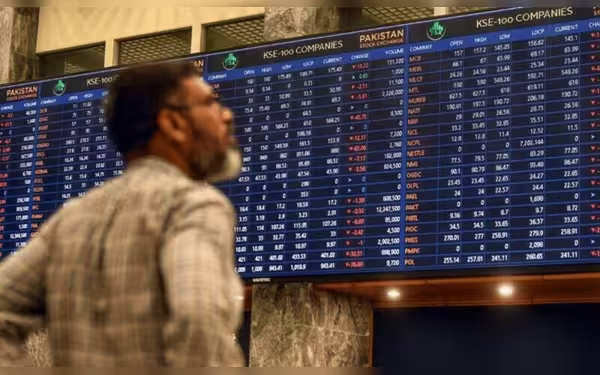Sunday, December 22, 2024 03:18 AM
KSE-100 Index Surpasses 98,000 Points as Banking Sector Drives Rally
- KSE-100 index closes above 98,000 points for the first time.
- Political unrest influences investor sentiment amid buying rally.
- Major banks and sectors contribute to the index's upward movement.
 Image Credits: brecorder
Image Credits: brecorderKSE-100 index closes above 98,000 points, driven by banking sector amid political unrest in Pakistan.
The Pakistan Stock Exchange (PSX) has made history as the benchmark KSE-100 index closed above 98,000 points for the very first time. This remarkable achievement comes amid a buying rally, particularly led by the banking sector, which has shown resilience despite a mixed trend in the market. On Monday, the KSE-100 index began the trading session on a low note, dipping to an intra-day low of 97,137.63 points shortly after the market opened. However, as the day progressed, buying activity surged, propelling the index to an impressive intra-day high of 99,317.47 points before it settled at 98,079.78, marking an increase of 281.55 points or 0.29% compared to the previous close.
Key players in this upward movement included major commercial banks, along with the fertilizer and pharmaceutical sectors. Notable stocks such as HBL, NBP, MEBL, UBL, MCB, HUBCO, PSO, SSGC, and FFC all contributed positively, pushing the index higher. However, the market's performance was not solely driven by economic factors; political dynamics also played a significant role. The political landscape in Pakistan has been charged, particularly with the ongoing situation surrounding Imran Khan, the jailed founding chairman of the Pakistan Tehreek-e-Insaf (PTI). Thousands of his supporters initiated a "decisive" long march towards the federal capital, challenging government barricades in their quest for political change.
In response to the march, law enforcement agencies took action by arresting hundreds of PTI supporters in the twin cities of Rawalpindi and Islamabad. The demonstrators are pressing the government to address three key demands: the release of PTI political members from jails, the abolishment of the controversial 26th Constitutional Amendment, and the return of what they describe as PTI’s "stolen mandate." This political unrest has undoubtedly influenced investor sentiment, as many are closely monitoring the developments.
Last Friday, the KSE-100 index experienced a significant drop due to profit-taking, which erased nearly all intra-day gains. The index fell to the 97,500 level after reaching a high of 99,623.03 earlier in the session. The market was predominantly bearish, with a sea of red on the charts, but the banking sector managed to keep the benchmark index afloat.
On a global scale, Asian stocks rallied alongside US equity futures, while the dollar weakened against its rivals as bond yields decreased. This shift followed the appointment of Scott Bessent as the next U.S. Treasury secretary, with investors optimistic about his potential influence on market policies. The MSCI’s broadest index of Asia-Pacific shares rose by 1.6%, and US S&P 500 futures indicated a 0.5% increase, nearing record highs.
In the local currency market, the Pakistani rupee remained stable against the US dollar, closing at 277.75, reflecting a slight gain of Re0.01. However, trading volume on the all-share index saw a significant decline, dropping to 640.26 million shares from 1,249.09 million on Friday. The total value of shares traded also fell to Rs25.62 billion from Rs45.47 billion in the previous session. Hascol Petrol emerged as the volume leader with 64.82 million shares traded, followed by Cnergyico PK and Fauji Foods Ltd.
The historic closing of the KSE-100 index above 98,000 points is a significant milestone for the Pakistan Stock Exchange, reflecting both market resilience and the impact of political events. As investors navigate through these turbulent times, it is crucial to remain informed and vigilant, as the interplay between economic performance and political stability will continue to shape the market landscape in the coming days.













